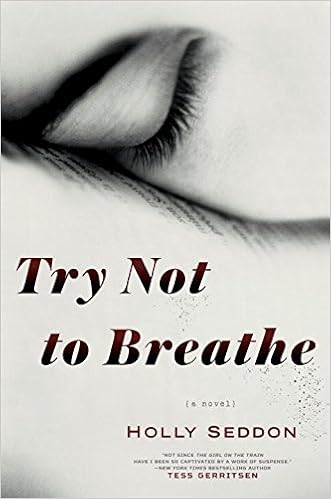 Reviewed by Justin Goodman
Reviewed by Justin Goodman
Try Not to Breathe
by Holly Seddon
Ballantine Books
Hardcover: 368 pages, February 23, 2016, ISBN-13: 978-1101885864
I have a very strong opinion about Final Fantasy XIII, as my brother knows, which can be adequately summed up in two words: successful failure. It’s a feeling I recently re-experienced in Holly Seddon’s debut novel, Try Not To Breath, the story of a fallen journalist trying to discover who beat a 15-year old into a catatonic state over a decade prior. Not as rich and twisting as its sibling Gone Girl (to be fair, Gillian Flynn’s third novel), or as refined as its’ distant cousin Atonement (Ian McEwan’s eighth), Seddon’s remains a consistent novel about betrayal and the burden of secrets. More than this, Try Not To Breath is a unique attempt to portray the life of the unconscious in a literal sense. Regardless of how stilted and unrealistic it may seem.
Amy’s story is well known by the time Alex Dale visits the comatose ward for a quality-of-life story she’s commissioned to write. Her marriage and career in tatters, less than a year to live if she can’t stop drinking, she forms an interest and bond with the perennially teenage girl. “’How terrible to have no voice’” Alex says, precisely pinpointing why she bonds with a victim of rape and assault from a different world. Their relationship, although one-sided, is explicitly emotional without melodrama. Its monologue-ish nature, in fact, makes it a sincere portrayal of a weak and dependent person finding—not independence—but a healthier location to place their neediness. It’s no less touching and dependable a characterization when it comes to Amy’s boyfriend (at the time of her assault), Jacob, who is hell-bent on ruining his marriage to the pregnant Fiona by keeping his visits to Amy’s bedside a secret.
Try Not To Breath, in the typical detective fashion, is slow and methodical. However, if you’re expecting a story filled with attempted assassinations and overflowing with violence you’ll be disappointed to hear that all the drama that Seddon writes is internal. For that reason, it’s hard to say its thrilling in any capacity or, honestly, gripping. Sometimes it even becomes a burden to slump through the short chapters. It’s a peculiar approach that comes across as if Seddon is uncertain of what she’s trying to do; roughly ten chapters are dedicated to Amy hazily experiencing the world outside her—an important distinction made early on is that Amy is not “brain dead” but comatose, can vaguely understand what’s around—stylized as exposition, reflection, and a half-hearted engagement with the events of the novel. Amy, paradoxically, restrains the story’s progression as she acts as the focal point of all its happenings.
Does it make sense? Does it matter? “I used a lot of artistic license when dealing with Amy’s condition,” Seddon acknowledges. Which, in a story focused on a “lifestyle journalist whose recent idea of research was a hasty Wikipedia search,” might be fitting. Less so in a story where this description is Alex Dale scorning herself for half-assing an important task, and where the point is the unraveling clues without the pointless mystifying of the victim. Amy, when thinking about her attacker, whom she knows and whom we know knows her attacker, refers to him by name only after it is revealed who he is. This is the sign of a novice. Perhaps it’s hard to turn a cold case into serious drama (seven seasons of Cold Case suggest otherwise), but when the most thrilling experience of an investigation is a character accidentally breaking his leg or soap opera marital disharmony, the word “thrilling” doesn’t seem quite right. Try Not To Breathe reads more like a domestic drama with a crime drama subplot.
It worked for Gone Girl. Not to the same degree, it works for Try Not To Breathe. That’s what Seddon brings to fruition more than anything. It’s the same way her stretching into sci-fi with her short story “Graduate Schemes,” published in the dystopian anthology Broken Worlds, leans closer to squabbling than the high stakes of a truly broken world. Don’t get me wrong. It’s an interesting story deserving of its place in the anthology. Rather, when Holly Seddon sets her mind on a genre, she tends to step away from the typical pre-requisites of the genre in order to portray human character in conflict with itself as it attempts to transition from one need to another. Like Amy, it seems, we can’t escape ourselves, no matter what the story. It’s important to remember that Alex Dale is, first and foremost, a “lifestyle journalist.” Plenty of frills, few thrills.
About the reviewer: Justin Goodman graduated from SUNY Purchase with a B.A. in Literature. Having moved from Long Island, he now lives in the City with reviews in Cleaver Magazine and InYourSpeakers, and work in Italics Mine, 360 Degrees, and Counterexample Poetics.